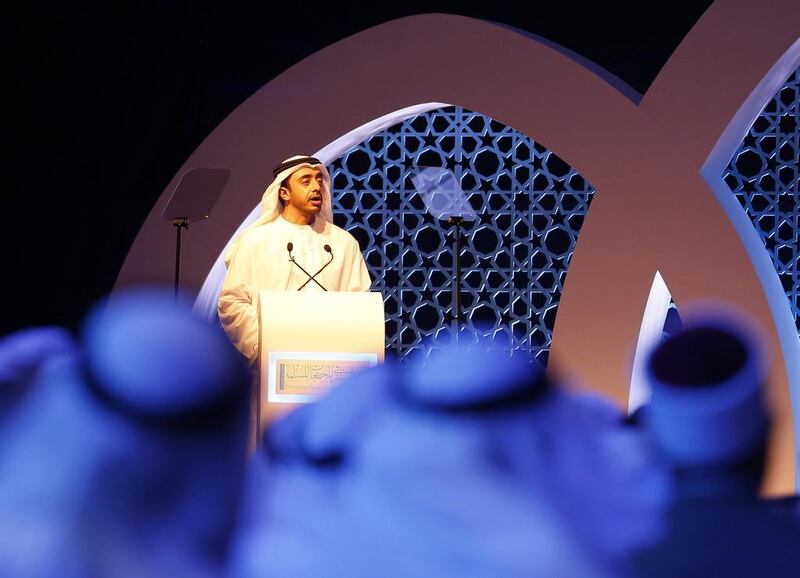ABU DHABI // Ahmed Mohammed el Tayeb, the Grand Imam and president of Al Azhar, has criticised organisations and countries that claim to seek peace, but fail to act.
The Egyptian religious leader was speaking at the first day of the Promoting Peace in Muslim Societies conference at the St Regis Saadiyat Island Resort.
At the event, which is held under the patronage of Sheikh Abdullah bin Zayed, the Foreign Minister, academics and religious leaders convened in the capital to discuss reducing conflict in the Muslim world and beyond.
Mr El Tayeb said while the United Nations and some other human-rights organisations purported to preserve peace and security across the world, their efforts were not equal between countries.
“They allegedly [exist] for the prosperity of mankind and human development. It is not surprising to see how an organisation such as the UN is unable to do its duty in the prevention of policies of injustice,” he said.
“Even though 66 years have passed since the UN was founded to confront threats to world peace, the organisation decides who deserves to achieve peace according to its own personal advantage.”
He said the world’s superpowers created enemies to wage war against to deflect their populations’ anger away from local issues. This was a way of “erasing peace and encouraging worldwide aggression”.
He said that history proved the difficulties in attaining peace.
“The history of humanity is filled with lakes of blood,” he said.
“Peace is the basis of human’s lives, with violence and wars as exceptions to that base.
“But history shows humanity was not blessed with peace and during its 3,500 years only 268 years were spent in peace while the rest of the years were spent in wars,” he said.
The opening ceremony for the event was addressed by Sheikh Abdullah bin Zayed.
He said: “Our religion has come to unify mankind, to spread love and the spirit of fraternity among people, regardless of their different religions and doctrines. Islam, therefore, has come to unify us.
“One of the main causes of sectarian wars and disputes that tear our nations apart is the absence of a rational voice, and the collapse of the principle of respect for differences, on which humanity is built. Also, the false scholars who take leadership and prominent positions issuing fatwas and misinforming others,” he said.
He ended his speech with expessions of hope that resolutions could be found during discussions at the forum.
Another speaker was the Mauritian religious expert Abdullah bin Bayyah, director of the Global Centre for Renewal and Guidance and deputy head of the International Union of Muslim Scholars.
He said the reason for this forum was to find a solution to the bloodshed.
“The world is going through situations that we cannot describe, but the situations describe themselves. The bloodshed speaks for itself. Looking for peace is a right,” he said.
He said having and providing peace gave citizens of the world a guarantee of life, while expressing a wish to “build a peace fort”.
He said the forum came at a time that required the right people, with enough love and knowledge, to spread the awareness on the need for peace and tranquility.
The forum will continue on Monday where the topics for discussion include how to correct misconceptions of Islam, the responsibilities of preachers, and the religion’s contribution to world peace.
aalkhoori@thenational.ae






